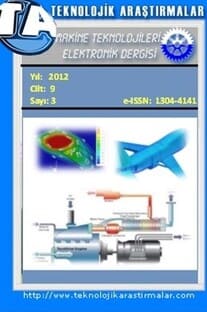Eğitim amaçlı esnek ve modüler üretim sistemlerinin teknik eğitimde kullanılması
Önceleri yaşantımıza sanayileşme fırtınası içinde giren mekanizasyon sistemleri ve ürünleri, bilgi teknolojisinin gelişimi ile boyutunu mekanik-elektrik-elektronik-bilgisayar bütünlüğü içindeki sistem ve ürünlere bırakmıştır. Teknolojide yaşanan büyük gelişmeler ile birlikte birçok teknolojinin bir arada kullanılması zorunlu hale gelmiştir. Bu kapsamda ortaya çıkan ve Mekatronik Sistemler olarak adlandırılan yeni bir mühendislik alanı oluşmuştur. Gelişen bu teknolojiler sayesinde insan gücüne dayalı üretim yerini bilgisayar veya mikro kontrolör kontrollü makinelere bırakmıştır. Günümüzün rekabete dayanan üretim sanayisinde pazar payı bulabilmek için sürekli değişen tüketici taleplerine cevap verebilmek gerekmektedir. Bu sebepten dolayı üretimin esnek olması bir zorunluluk haline gelmiş ve yaptıkları iş birbirinden farklı fakat birbirleri ile haberleşerek çalışan üretim istasyonlarından oluşan modüler üretim sistemleri fabrikalarda yaygın olarak kullanılmaya başlanmıştır. Bu çalışmada, teknik eğitimdeki ilgili disiplinlerde kullanılan esnek ve modüler üretim sistemleri hakkında kısa bilgiler verilmiştir. Uygulama örnekleri olarak, Afyonkarahisar Kocatepe Üniversitesi Teknik Eğitim Fakültesi Elektrik Eğitimi Bölümünde bulunan Esnek Üretim Sistemi (FMS-Flexible Manufacturing System) ile Marmara Üniversitesi Teknik Eğitim Fakültesi Mekatronik Eğitimi Bölümü’ndeki Modüler Üretim Sistemi (MPSModular Production System) verilmiştir. Bu sistemler ile eğitim alan öğrencilerin endüstriye yapabilecekleri katkılar incelenmiştir.
Using flexible manufacturing system and modular production system in technical education
Mechatronic refers to the efficient and effective integration of mechanical systems and electronics. It integrates the classical fields of mechanical engineering, electrical engineering, and computer science/information technology. The purpose of this interdisciplinary engineering field is the study of automation from an engineering perspective and the controlling advanced hybrid systems. By means of these improving technologies, production based on manpower supersedes to the computer or microcontroller controlled machines. To find a part on the market based on competitive production industry, producer must meet chancing demand of consumer constantly. For this reason flexibility of production is to be a necessity. Therefore modular production systems consisting of production stations are widely used in factories. The main advantage of a Flexible Manufacturing System is its high flexibility in management of manufacturing resources like time and effort in order to manufacture a new product. The Modular Production Systems concept represents a radically new product-oriented manufacturing paradigm, which is based on a building production system from standardized machine elements. The overall objective is to provide a production methodology, which will enable an entire production system to be rapidly designed and configured for a wide range of consumer products with minimal delay, cost, and need for specialized machinery. In this study, firstly short information is given about flexible and modular production systems. FMS (Flexible Manufacturing System) at the Afyonkarahisar Kocatepe University Technical Education Faculty Electric Education Department and MPS (Modular Production System) at the Marmara University Technical Education Faculty Mechatronics Department are given as sample applications. Contributions to the industry by the students, who will be educated by these systems, have been investigated.
___
- 1. ÖZTUNA, S., “Günümüzde Mekatronik Düşünce”, Otomasyon Dergisi, Ocak 2005, Sayfa: 86-90.
- 2. SHETTY, D.; KONDO J.; CAMPANA, C.; A. KOLK, R., 2002, “Real Time Mechatronic Design Process for Research and Education”, Proceedings of the American Society for Engineering Education Annual Conference & Exposition Copyright
- 3. ERDEM, G.; DÜZYOL, B.; ŞEREFLİCAN, F., 2004, “MPS Sistemlerinin İncelenmesi ve Parça İşleme, Nakil, Ayırma ve Depolama Otomasyon Sistemi”, MÜTEF Elektrik Eğitimi Bölümü Bitirme Projesi.
- 4. HESSE, S., 1999, “Rationalization with Handling Technology”, Festo
- 5. Modular Production System (MPS), www.ias.uni-stuttgart.de (Ocak 2005)
- 6. TANVIR, H.; GEORG, F., April 2005, “Migration of a PLC Controller to an IEC 61499 Compliant Distributed Control System : Hands-on Experiences”, Proceedings of the 2005 IEEE International Conference on Robotics and Automation ICRA’05, Barcelona, Spain, 3995-4000.
- 7. S. TAŞKIN, “MPS Modüler Üretim Sisteminin Bilgisayar Destekli Gerçek Zamanlı Kontrolü ve Teknik Eğitime Uygulanması”, 2007, Marmara Üniversitesi Fen Bilimleri Enstitüsü Doktora Tezi, İstanbul.
- 8. TAŞGETİREN, S., GÖKÇE, B., 2004, Uygulamalı Endüstriyel Otomasyon (Taslak Baskı), Afyon
- 9. BROWNE, J.B., HARHEN, J., SHİVNAN, J., 1988, “Production Management Systems: A CIM Perspective”, Addison – Wesley Publishing Co.
- 10. Festo Didactic: “Learning System for Automation and Communications”, “Modular Production System”, Training Documentation, 2001.
- 11. KARCI, H., Eylül 2005, “Mekatronik Eğitiminden Endüstrinin Beklentileri”, I. Uluslararası Mesleki ve Teknik Eğitim Teknolojileri Kongresi, İstanbul
- 12. KARCI, H.: Ocak 2006, “Mesleki ve Teknik Eğitimde İyileştirme Potansiyeli”, Otomasyon Dergisi, Sayı 164.
- ISSN: 1304-4141
- Yayın Aralığı: Yılda 5 Sayı
- Başlangıç: 2004
- Yayıncı: -
Sayıdaki Diğer Makaleler
Araba lastiğinin farklı düşey yük ve basınçlar altında gerilme analizi
Murat KARAKUŞ, Murat ÇOLAKOĞLU
Bir doğal kompozit malzeme: Diş
Sistem düşüncesinden sistem dinamiklerine
Eğitim amaçlı esnek ve modüler üretim sistemlerinin teknik eğitimde kullanılması
Hasan ÇİMEN, SEZAİ TAŞKIN, İSMAİL YABANOVA
Supapsız beş fazlı bir dizel motor
An experimental study of glass-epoxy laminated composite pin-joints
